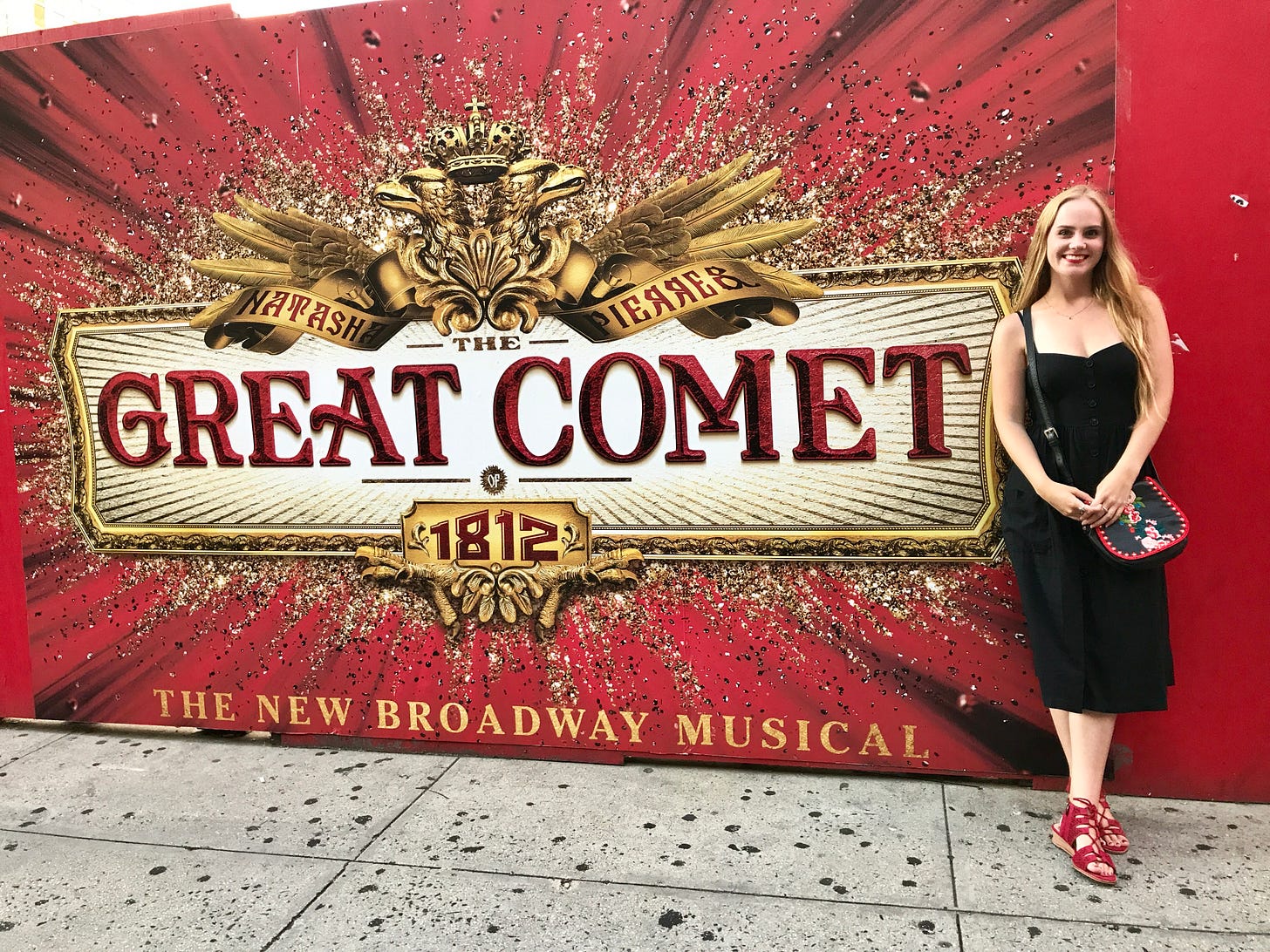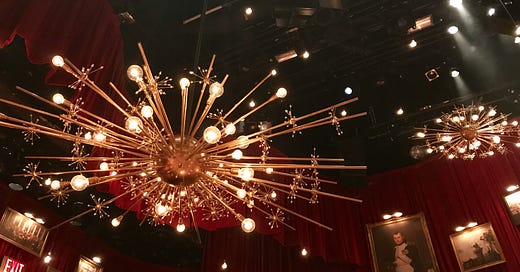Regarding the news that the musical has been made into a motion picture, I must declare: I still don’t know what Dear Evan Hansen is about, even after reading the Wikipedia summary and watching the trailer, and frankly, I don’t care to learn.
Listen. I don’t consider myself one who holds grudges.
(That’s a lie for dramatic effect.)
As a saint! Who doesn’t hold grudges! I can and will never forgive that stupid little show.
At the 2017 Tony Awards, Dear Evan Hansen beat out my oh-so-beloved, electro-opera War and Peace adaptation for Best Musical.
A musical that had the most nominations that season, coming to 12: Best Musical, as we said, Best Original Score, Best Orchestrations, Best Book, Best Actress, Best Actor, Best Featured Actor, Best Scenic Design, Best Costume Design, Best Lighting Design, Best Direction, and Best Choreography.
A musical set in 19th century Russia that featured several Black leads,1 before Bridgerton ever tried it. “A breathless, roguish, and ravishing quasi-opera” that combined “punk riffs [with] agitated Broadway ballads,” “gritty Russian folk songs [and] drinking choruses with klezmer clarinets.”
A musical that had its actors singing and dancing in the aisles, some lucky few of the audience seated on the stage, brilliantly creating a collective experience rather than a mere show.

A musical that lifted its story from only seventy pages of the original source material. 70 pages of War and Peace, my two copies of which boast 1,273 and 1,408 pages respectively. Countless translated lines from Tolstoy, somehow slipped into a modern Broadway show and as poetic, philosophical, and fun as Les Mis (Victor Hugo, coincidentally, influenced Tolstoy tremendously while he wrote War and Peace).
A musical about a young woman in love, who makes a great mistake and suffers for it; and a young man who can’t figure out his purpose, fails at everything he tries, and feels completely unfulfilled. A musical that nevertheless ends on a lovely note full of hope.
I could go on, but I’ll spare you. Still, all of that gorgeous resplendence, beat out by a teenage boy with a broken arm?
Tolstoy himself couldn’t describe the maelstrom of emotions that surged within me upon hearing that news.
It’s funny, how words fail to bear the weight of their meaning. I could say, “War and Peace changed my life,” and truly mean it, but the words themselves just sound trite, overly earnest, kind of boring. Like, I love a book about a bunch of angsty aristocrats. Groundbreaking.
But I still remember the moment War and Peace utterly shattered me: summer 2016, my bed, 3 am. Sobbing while my roommate came home from a night out. I remember driving 4 hours from my college town to my hometown, that next day or a few days after, and putting on the soundtrack of the BBC miniseries adaptation in the car. I cried no less than 8 separate times.
I remember how, after ranting and raving about the book on Tumblr, some kind soul sent me an anonymous message. “Have you heard of Natasha, Pierre, and the Great Comet of 1812?”
I would give my firstborn child to that person if I could. Whatever star bore them, they—you guessed it—changed my life.
When people ask my favorite book, I always sigh a little. I have to say War and Peace—undoubtedly it’s the book that’s most shaped my entire adult life since 2016. But it’s also a ridiculously long classic full of weird philosophy essays alongside 100-page battle scenes, and it intimidates or bores more readers than it inspires.
How do I convey how alive, vibrant, and immediate War and Peace feels to me, even though its story is so dusty by now, or bare my soul to someone I just met by explaining what kind of meaning I find in it?
I point to the existence of a musical adaptation as proof. This is full of drama and humor and meaning! It’s for everyone, about anyone! It’s not perfect, and I hate the epilogue as fiercely as I love the book itself, and Tolstoy was far too opinionated, but there’s so much to love!
As of yet, there is no official video recording of The Great Comet, only shaky bootleg .movs. There is certainly no feature film. There are adaptations of the original novel, yes, but they lack the je-ne-sais-quoi of composer Dave Malloy’s bizarre, exhilarating vision.
I watch the BBC miniseries every year or so, read the book every few years, and each time, the story offers up something new to love. With every life experience I have, whether it be good or bad, I understand the characters a little more, a little differently, understand myself better too, and scrounge up a little more compassion for Tolstoy (horrible man). But though the book has—
battles, love affairs, births, deaths, changing family fortunes, unforgettable scenes of wolf hunts, Russian dancing, starlit troika rides, the great comet of 1812—the entire spectrum of human life…in all its grandeur and imperfection2
—and though those things are delectable, devastating, divine…the musical is an experience I can never truly relive, and so all the more precious to me.
And look, I’m not saying The Great Comet lost Best Musical because Kevin Spacey hosted the Tonys that year, but surely that was a bad omen.
—Alexa
Denée Benton as Natasha, Okieriete Onaodowan as Pierre, and Amber Gray as Hélène.
From the front flap of Anthony Briggs’s translation.




